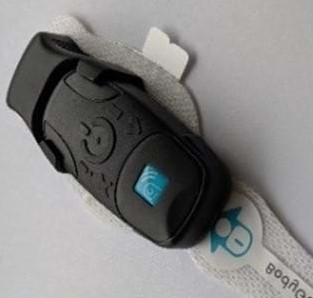Heart monitor
Can you help doctors prevent stroke and dementia?
If you are aged 65 and over and attending one of our imaging centres you may be asked if you would be prepared to help us learn more about the impact that heart rhythm disturbances, such as atrial fibrillation (AFib), may have on your cardiovascular health and cognitive function. AFib is common, is often intermittent and free of symptoms, and may lead to stroke, heart failure and cognitive decline. British Heart Foundation Professor Barbara Casadei from Oxford University explains why this is important.
If you agree, we would ask you to wear a special heart monitor for two weeks. Why? Because a short one-off assessment (for example with a routine electrocardiogram/ECG) is unlikely to pick up intermittent arrhythmias.
The heart monitor we use is known as the BodyGuardian® MINI (pictured) and is provided by a company called Preventice Technologies. The monitor is wireless, about 17cm long and weighs just 35g. It is held on by a special adhesive, so some men may require a small area of chest hair to be shaved. The monitor is waterproof and can be safely submerged in water as deep as 3 feet, so it can be worn whilst showering, bathing and swimming, and should not interfere with day to day activities.

Vital research to advance our knowledge of abnormal heart rhythm
The UK Biobank Imaging Study is ideally suited to undertake this important work. This is because together with the data participants have already provided about their health, information from heart and brain scans, which are undertaken at the assessment, it will provide vital data to advance our understanding of the impact of intermittent arrhythmias on heart and brain health. Blood samples provided previously will also advance our knowledge of genetic determinants of abnormal heart rhythm.
Read more about the research below:
If you are taking part watch the heart monitor instruction video to help attach your monitor.
Last updated
